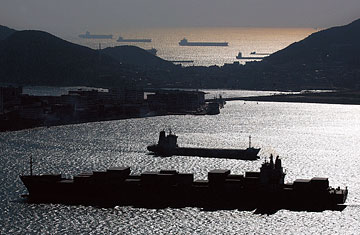
Troubled waters: Container ships sail by the South Korean port of Pusan. The World Trade Organization predicts 2009 will see the steepest decline in global trade since World War II
(2 of 2)
Which raises the question, one that trade economists have to answer every 10 years or so: If protectionism is so ruinous, why does everyone reach for it in tough times? To answer that, you have to go back to why trade is good for you. The idea that an exchange of what you have for what I have makes both of us better off must be as old as the first moment anyone swapped cowrie shells for some cooked fish. Organized trade is ancient: silk did not get to Rome because the Romans figured out sericulture; someone imported it from China. But it took until 1817, and the work of the British political economist David Ricardo, for anyone to cloak a theory around something that humans had been doing since time immemorial. Ricardo showed that if nations concentrate on what they do best — those things in which they have a comparative advantage — and trade for the rest, their welfare will increase. The magic of trade is that it encourages economic specialization. If the fruits of that specialization can be freely exchanged, everyone benefits. (Read "Protectionism on the Rise in Europe?")
"Everyone," of course, is an aggregate. One difficulty with trade, and the reason that it becomes controversial at times of economic hardship, is that while its benefits are widely spread and difficult to measure, its costs are concentrated and often easy to see. The gains manifest themselves, for example, in low prices at the supermarket. But consumers are many, and they are not politically organized. By contrast, those who can be identified as losing out because of trade — like automobile workers who have lost their jobs to imports — are relatively few and are easy to marshal into political communities with clear messages.
There are massive ironies in the "protection" of those damaged by imports. If you listen to many politicians, especially American ones, you would think that imports are bad, a signifier of economic failure. Trade only "works" if a country runs a surplus. (A logical impossibility when extended to all countries, but never mind.) Free-traders scream: No! It is imports, not exports, that are the whole point of trade; we trade precisely so we can enjoy those goods in whose production others have a comparative advantage. But that message is not easy to get across in hard times.
There is a second difficulty in making the case for trade during downturns. Trade is a global phenomenon; politics is national. When unemployment lines lengthen, politicians understandably feel that they have to respond to the immediate needs of their constituents, not those (to adapt an infamous phrase of Neville Chamberlain's) in a faraway country of which they know little.
Yet it is precisely that mind-set, however natural it may be, that most needs challenging. It does not take any simplistic endorsement of the benefits of economic globalization to understand that we live in an interconnected world. It isn't just goods that move around the planet. The flow of people from one nation to another — people with all their myriad hopes and resentments — has been taking place on a scale never seen before. Prosperity does not solve everything, God knows, but the world will be a safer place if those who have recently escaped poverty are not now told by those who have never known it that they have to accept less than they dreamed of. "We cannot deny people their aspirations" said Nandan Nilekani, co-chairman of Indian IT giant Infosys Technologies, in an interview by the New York Times's Thomas Friedman at the New York Public Library this week. Do so, and those denied aspirations will mutate into something much more dangerous.
As Brown says, the key issues that the world faces today cannot be dealt with by rich nations acting alone. That is as true of the regulation of global financial markets as it is of the relief of poverty. Climate change cannot be tackled by any one nation, or any group of nations, however rich and powerful they may be; any solution that does not include within its policy parameters India and China is worthless. (Read TIME's special report on The G-20, including an interview with Gordon Brown.)
Poverty, climate change and economic dislocation are all issues that, if not handled properly, could engender real political instability. Trade, just by virtue of its existence, makes international cooperation concrete. With all trade's potential to improve lives — so richly realized on those Asian riverbanks — it makes our world a safer and a better place. Now is not the time to turn our backs on it.
